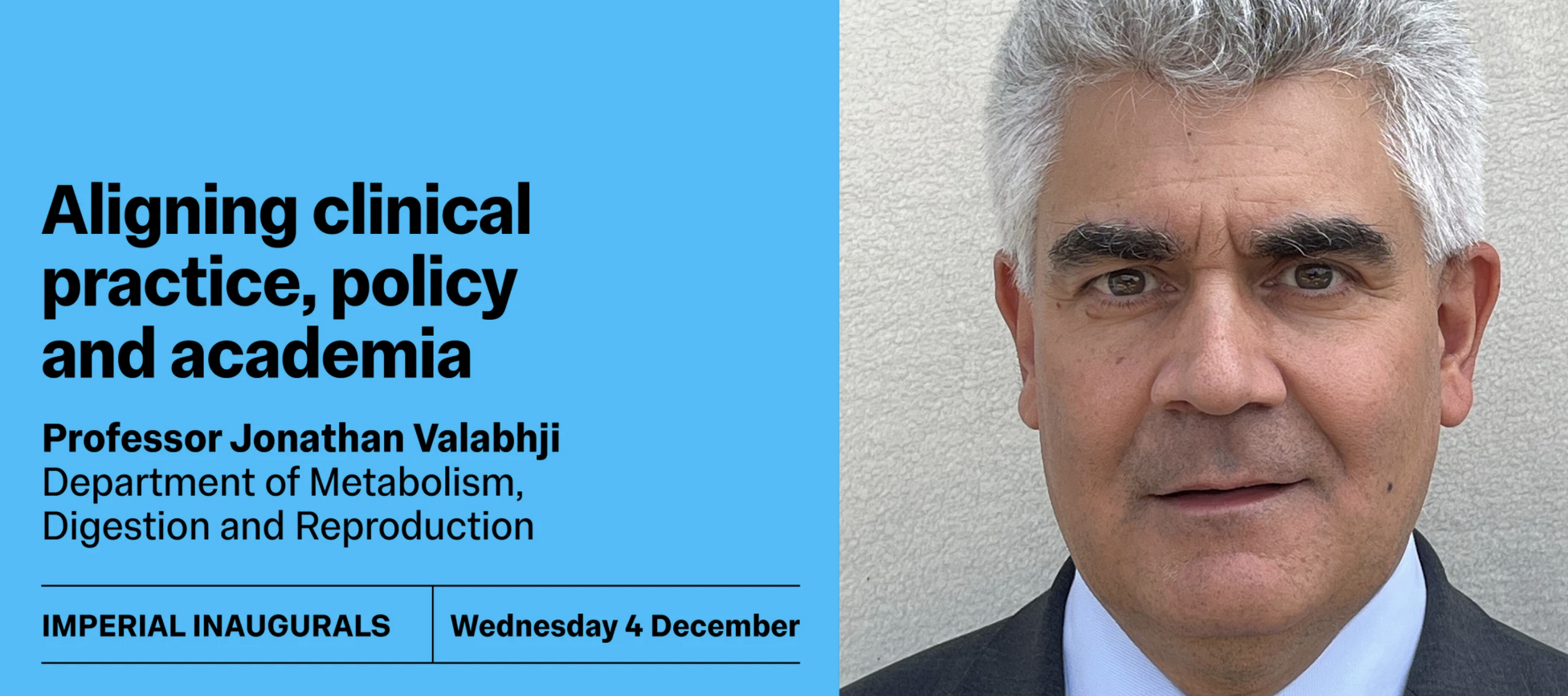
Diabetes now affects over half a billion people globally, including 3.8 million people in England. Type 2 diabetes, which accounts for 90-95% of all cases, has obesity as its primary modifiable risk factor. Expanding waistlines, both nationally and globally, have driven a steady increase in type 2 diabetes rates in recent decades. To mark World Diabetes Day, Professor Jonathan Valabhji OBE, from the Department of Metabolism, Digestion and Reproduction, reflects on his 30 years of experience in the field, in clinical practice, in national leadership, and in clinical and epidemiological research.
My background in Diabetes research and clinical practice
I qualified as a doctor in 1990 from St Bartholomew’s Hospital Medical College, London. I undertook specialist training in diabetes, endocrinology, and general medicine in North-West London, and landed at Imperial College in 1997 to undertake my MD (Doctor of Medicine degree) as a British Heart Foundation Junior Research Fellow. In those early years, I was interested in cardiovascular disease in diabetes, which at that point was responsible for the majority of deaths in people with diabetes. My work centred on understanding the paradox in type 1 diabetes: although patients often displayed healthy cholesterol profiles, they were at elevated risk of heart attacks and strokes. I spent 3 years in a lipid laboratory, using ultracentrifugation (a technique used to separate and isolate particles based on their density) to isolate high-density lipoprotein (HDL) cholesterol particles from blood samples, to try to disentangle the paradox.
Population-level progress in cardiovascular health
While I like to think that some of that early research advanced the field a little, it was other epidemiological and societal factors that saw cardiovascular disease fall in people with diabetes over the next two decades. Public health initiatives, such as reduced smoking rates, and improved management of blood glucose, blood pressure, and cholesterol, have collectively driven a marked decrease in cardiovascular complications, resulting in longer lifespans for people with diabetes. However, with this success came new challenges, as other and multiple long-term conditions (MLTCs) have increasingly become leading causes of illness and death. This has complicated care for patients, healthcare professionals, and the NHS. At the same time, obesity has driven younger onset of type 2 diabetes, contributing to accelerated development of MLTCs at younger ages.
Advancing clinical practice and research at St Mary’s Hospital
After a couple of years as a Clinical Lecturer at Imperial, I moved into a full-time clinical post in 2002 as a Consultant Physician and Diabetologist at St Mary’s Hospital, Imperial College Healthcare NHS Trust. The specialist clinics that I established there formed the basis for my clinical research at that time, particularly my multidisciplinary diabetic foot service, through which we achieved and published some of the lowest rates of diabetes-related leg amputation internationally.
National leadership and public health initiatives
After local and regional leadership roles, in 2013 I was appointed National Clinical Director for Diabetes and Obesity at NHS England, a role I undertook for the next decade. This provided me with a broader population-health perspective, complementing the individual patient-level perspectives that clinical practice had already provided for me. This shifted my research focus more to epidemiology and implementation science, applying real-world data derived from electronic patient records, to evaluate the impacts of interventions that I have had the opportunity to implement at scale across England.
For example, to address rising incidence of diabetes, in 2014 I successfully made the case for, and then led the implementation of, the NHS Diabetes Prevention Programme in England. Through digital and in-person delivery, over 1.6 million people with pre-diabetes have now been referred in, with published evidence demonstrating reduced type 2 diabetes incidence in programme participants and at English population level associated with programme implementation. I also successfully made the case for, and more recently completed implementation nationally, of the NHS Type 2 Diabetes Remission Programme. Applying real-world data, we have recently published our resulting remission rates of 30% at 12 months. 25,000 people have now been referred to the programme.
New leadership role and future directions in Multiple Long-Term Condition (MLTC) research
Just over a year ago, I stood down from my role as National Clinical Director for Diabetes and Obesity and from my NHS clinical post at St Mary’s Hospital and took up the role of Clinical Chair in Medicine at Imperial College, based on the Chelsea and Westminster Hospital Campus, where I practice as Honorary Consultant Diabetologist. At the same time, I have taken on a different national leadership role as National Clinical Lead for MLTC. The Health Foundation recently estimated that by 2040, there will be 37% more people living with a major illness in England, while the working age population will have increased by only 4% over the same period. Attenuating this potential 37% increase is therefore an important current policy initiative.
Experimenting with policy implementation to address MLTCs
In my current roles, I have the opportunity to take a more experimental approach to policy implementation in areas where evidence on intervention effectiveness is limited, such as MLTCs. Our retrospective data analyses have suggested that the 9-month lifestyle intervention that is the NHS Diabetes Prevention Programme, focusing on weight loss, more physical activity, and better-quality nutrition, may not only reduce the incidence of type 2 diabetes but also reduce the incidence of other and multiple long-term conditions. To test this hypothesis, I am soon to conduct a cluster-randomised study among patients with hypertension, applying the same intervention to assess its potential to prevent MLTCs in a different high-risk population.
By combining clinical practice, leadership, and research, I hope to continue contributing to policy and practice that improve health outcomes for people living with diabetes and other long-term conditions.
Professor Jonathan Valabhji’s Inaugural Lecture: Aligning clinical practice, policy and academia

Join us for Professor Jonathan Valabhji’s Imperial Inaugural online or in person. There is no need to register to attend so please be sure to use the add to calendar button. We look forward to seeing you on Wednesday 4 December at the City and Guilds Building from 17.30 – 18.30.